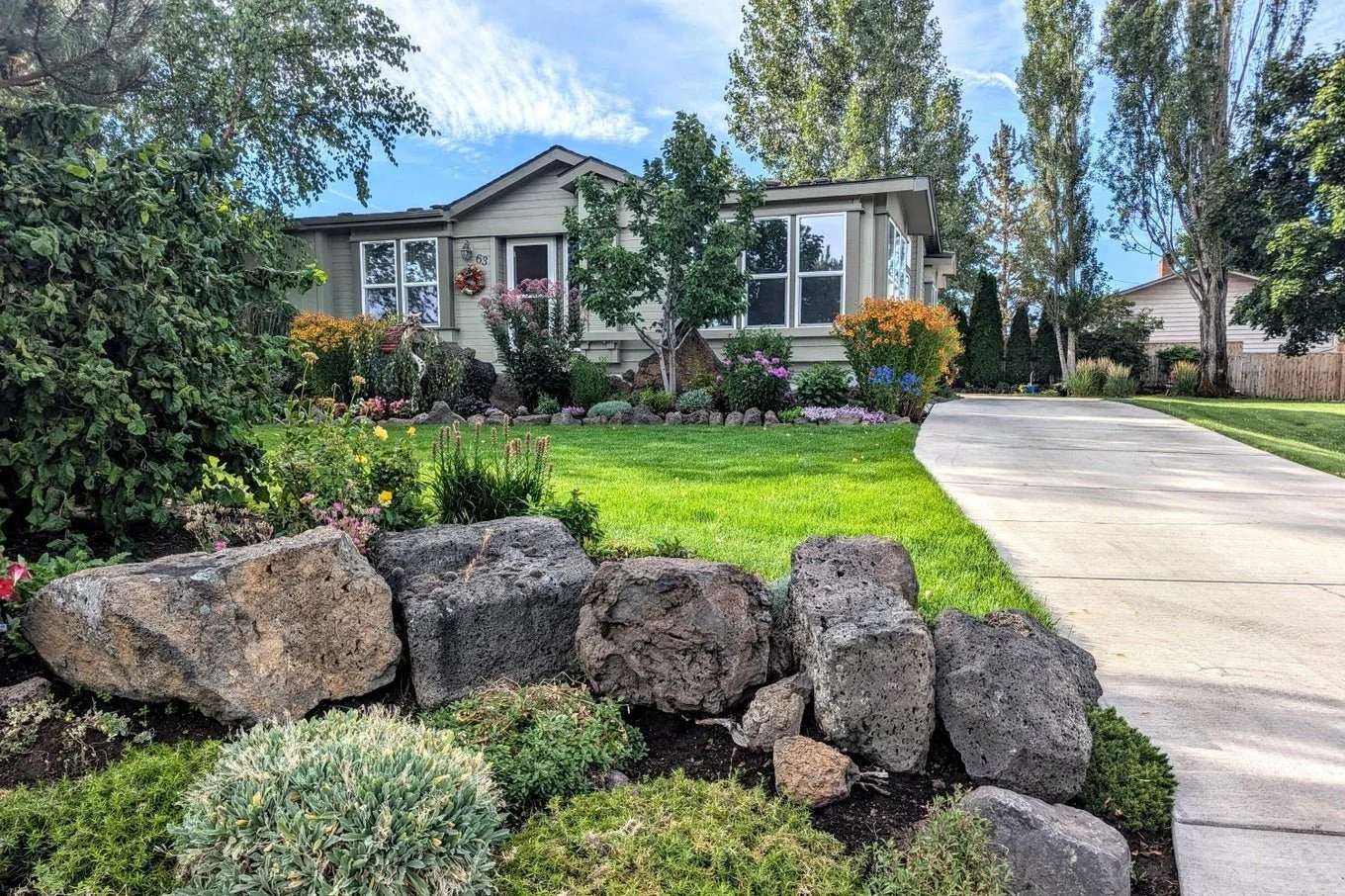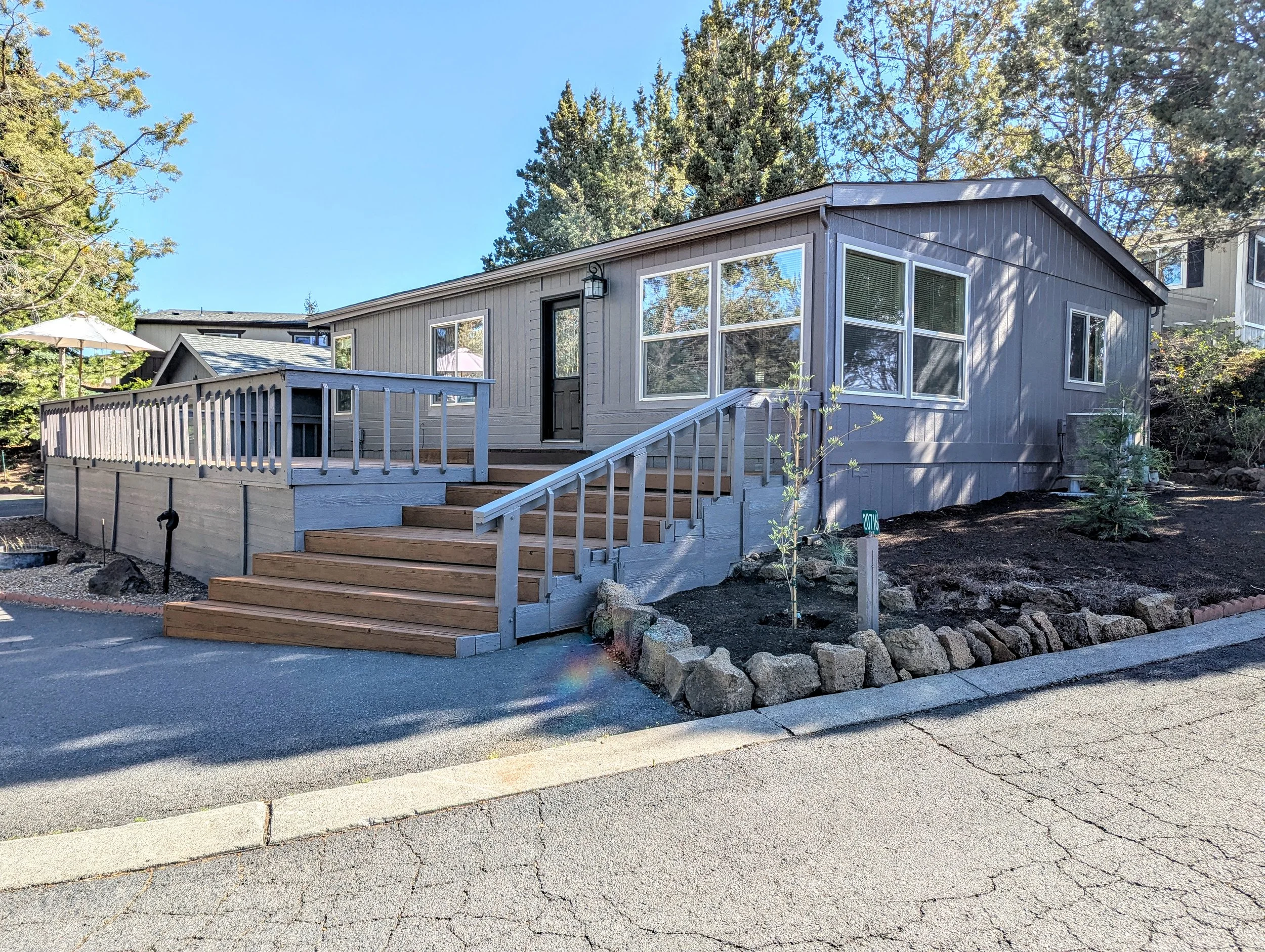Some Currently Available 55+ Community Homes
SOLD! - snowberry village #91
SOLD! - snowberry village #5
sold! - Snowberry Village #37
Buying in a Manufactured Home Park
Buying a manufactured home in a park means you are buying the home only and you will be leasing the space the home sits on. Each park typically has an on-site manager and is owned by a corporation or LLC. Because of that, each will have its own look and personality, different amounts of space rent, services that rent will include, and regulations & policies.
Real Estate Agents listing or selling a manufactured home in a park need to have a MSD or Manufactured Structures Dealer license in Oregon.
Bend and surrounding areas have several Manufactured Home parks. They may be family parks or 55+ communities. I encourage if you are interested in buying this type of home, that you visit and drive through the parks to get an idea of those neighborhoods. I have a map I will be glad to send you that highlights the locations of these parks. If you are interested, I can register you to receive market alerts in your email for the type of home or the area you are interested in.
Misconceptions about Manufactured Homes
Misconceptions about buying a manufactured home in a park are quite common, and it's important to dispel these myths to make informed decisions. Here are some common misconceptions:
Poor Build Quality:
Misconception: Manufactured homes are often perceived as having lower build quality compared to traditional stick-built homes.
Reality: Modern manufactured homes are nothing like the old single wides of the 1970’s. They adhere to strict building codes and standards. They are constructed with high-quality materials and undergo rigorous inspections.
Note: These homes need to be built strong enough to withstand being transported from the factory to the homesite. You need to visit one to see that it can feel just like a stick built home.
Depreciation Concerns:
Misconception: Some think that manufactured homes depreciate in value over time, unlike traditional homes
Reality: While the value of manufactured homes may not appreciate as rapidly as some traditional homes, they can still appreciate over time, especially with proper maintenance and improvements.
Note: Sales data charts will show the appreciation of manufactured homes sales over the last several years.
Ownership Challenges:
Misconception: There might be concerns about limited control over the land and potential difficulties in reselling the home.
Reality: Residents typically own the manufactured home itself but lease the land in a park. Most parks will welcome homeowner improvements to the space that is in accordance with their policies. While selling the home can involve park approval, it is a common and manageable process.
Negative Park Environments:
Misconception: Manufactured home parks are often associated with negative stereotypes, such as poor living conditions or undesirable neighbors.
Reality: Many manufactured home communities are well-maintained, offer amenities, and have active homeowner associations. It's essential to research and visit specific parks to assess their conditions.
Financing Challenges:
Misconception: Some believe it is harder to secure financing for a manufactured home compared to a traditional house.
Reality: While financing options may vary, there are various loan programs specifically designed for manufactured homes. Working with lenders familiar with these types of homes can make the process smoother.
Temporary Living Solution:
Misconception: Manufactured homes in parks are seen as a temporary or less permanent housing solution.
Reality: Many people choose manufactured homes as a long-term and affordable housing option. With proper care and maintenance, they can provide comfortable and durable living spaces.
Pros and Cons to Buying a Manufactured Home
Buying a manufactured home in a park comes with its own set of advantages and disadvantages. Here are some pros and cons to consider:
Pros:
Affordability:
Pro: Manufactured homes in parks are often more affordable than traditional site-built homes, making homeownership accessible to a broader range of individuals or families.
Lower Maintenance Costs:
Pro: Manufactured homes are typically smaller and may have lower maintenance costs compared to larger traditional homes. .
Community Amenities:
Pro: Many manufactured home parks offer community amenities such as parks, recreation areas, and communal spaces, fostering a sense of community..
Energy Efficiency:
Pro: Modern manufactured homes are designed with energy efficiency in mind, often meeting or exceeding energy standards.
Cons: (Most of these are addressed below)
Land Lease Costs:
Con: In many cases, homeowners lease the land in the park, incurring ongoing costs. Land lease fees can increase over time, affecting overall housing costs..
Restrictions and Rules:
Con: Residents in manufactured home parks are subject to park rules and regulations, which may include restrictions on exterior modifications, landscaping, and other aspects such as pets.
Perception and Resale Value:
Con: Some buyers may face challenges in selling their manufactured homes due to negative perceptions or stereotypes about such homes.
Limited Equity Building:
Con: Land lease arrangements may limit the accumulation of home equity compared to owning both the land and the home.
Potential Park Closure:
Con: There is a risk that the park may close or change ownership, affecting the future of the homes within the community. (See below)
It's crucial for potential buyers to do thorough research, work with knowledgeable professionals, and visit different parks to understand the realities of buying a manufactured home in a park. Each situation is unique, and dispelling misconceptions allows for more informed decision-making. It's essential to weigh the pros and cons based on individual preferences, lifestyle, and financial considerations. Conducting thorough research, visiting parks, and consulting with experts in the field can help potential buyers make informed decisions.
FAQ
What if the park is sold to a developer?
There is no way to predict the future, but here is my take: Historically in Oregon it has been rare to have a MHP sold to a developer in order to put in a whole new development. Parks are highly desired to be purchased by investors or kept by current owners because it is a great place to park money and have a good cash flow. I feel that parks that are well maintained show that there are probably no management problems for the owners. I may wonder more about parks that are not well kept. The park’s regulations will go over that scenario and you should get clarification from the park manager.
Does the space rent increase yearly?
The monthly space rent will go towards the park's maintenance, property tax, insurance, utilities, staff salaries, and amenities offered. The rent will usually increase over time because those costs go up for the park’s owners, just like those costs will increase for other homeowners. Buyers can ask the park manager for the history of space lease payments for the last five years.
Can I rent out the home or have a roommate?
All MHP in my experience are owner occupied only. As for roommates - people living in the home that are not on the ownership document - you need to ask the park manager about its policy.
Summary
A manufactured home in a park is a viable option for buyers who can get a nice home at a much lower cost than a stick built home. It can be a great option for retirees who sell their long-time home that is now too big for them to purchase another home and still have reserves in the bank.
Along with the lower purchase price, the yearly property taxes will be lower because the taxes are on the home only and not the land.
It is a situation of both owning and renting - the home is owned and the property it sits on is leased. The home can be remodeled and updated to increase its value and to the homeowner’s taste just like any other home. The home’s exterior and land will be subject to the park's policies as to any improvements. This is often an advantage to help keep up the home values in the park and keep it a pleasant place to live. The park also may have policies on pets and guests for a buyer to understand before purchasing.
Most of our area’s MHP were developed several decades ago. The supply of available homes on the market is limited. Some parks are very desirable with a list of buyers wanting to keep apprised of new listings. When a home does become available, there is no predicting what will be its size, condition or price. My suggestion is if you are interested in a particular park, that you be flexible on the home’s details, because those can be changed somewhat, and you don’t know when a home with all of your desires will be available. Like any other real estate, it’s all about location location location!




